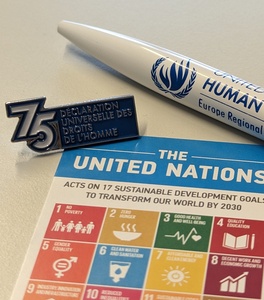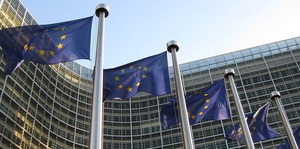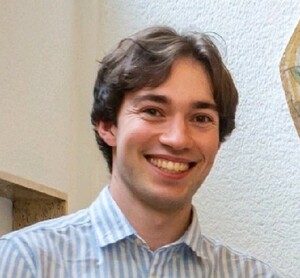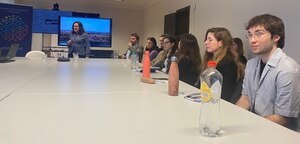UNU-MERIT master’s students take their global development studies to the EU’s heart
A guest post by Louis Géneau de Lamarlière, current student in our 2023-2024 MPP cohort and Communications Officer of DEMOS
Many of us know Brussels as the heart of the EU, home to the European Parliament, European Council and Council of the EU. However, another lesser-known but no less significant role of the Belgian capital is its housing of many UN agencies and institutions.
Last week (on 8 February), I had the privilege of visiting the UN Regional Information Centre (UNRIC) for Western Europe to learn more about the UN’s Brussels-based presence. This trip was part of the Global Governance for Development specialisation of the UNU-MERIT Master of Science in Public Policy and Human Development (MPP) programme.
After a short bus trip from Maastricht, my fellow specialisation peers and I arrived in the Schuman quarter of Brussels. Despite the typical rain, we strolled around the area, taking the opportunity to admire the EU offices and, most importantly, grab a quick coffee before beginning the visit to UNRIC. We quickly made our way to The Residence Palace where much of the UN in Brussels is located, and two interns guided us to our meeting room.
 Caroline Petit, the deputy director of UNRIC, delivered an introductory speech explaining the importance of strategic communications in maintaining the flow of information between UN institutions and the public. She emphasised the significance of young people joining the UN to uphold its missions and embody the values of inclusion, integrity, humility and humanity. During a brief Q&A session with Petit and a communications assistant, I asked whether prior training is necessary to be selected for an internship; the answer was that it is beneficial but not required, which is very reassuring!
Caroline Petit, the deputy director of UNRIC, delivered an introductory speech explaining the importance of strategic communications in maintaining the flow of information between UN institutions and the public. She emphasised the significance of young people joining the UN to uphold its missions and embody the values of inclusion, integrity, humility and humanity. During a brief Q&A session with Petit and a communications assistant, I asked whether prior training is necessary to be selected for an internship; the answer was that it is beneficial but not required, which is very reassuring!
Next, we heard from Raschad Al-Khafaji, director of the Food and Agriculture Organisation of the UN (FAO) Liaison Office with the EU and Kingdom of Belgium. He shed light on the importance of FAO’s status as a special agency of the UN, granting it autonomy and financial independence, allowing it to continue its apolitical role in the regulation, aid and management of the global agri-food sector. The discussion delved into the challenges of rural areas, with young workers moving to urban centres, thus leaving the countryside empty and farms without hands. Another area where young people are needed in FAO and in the UN, said Al-Khafaji, is in helping the multinational organisation appropriately and quickly manage AI. As someone with a family background in farming, I found this discussion particularly engaging, especially considering the rapid pace of technological advancements in the food and agriculture sectors.
Following this was a presentation by Elisabeth Diaz Hochmann, senior programme officer at the UN Development Coordination Office (UNDCO). She provided valuable insights into the transformative role of development in empowering people, especially in the face of oppression. On top of this, she offered great career advice on finding one’s place in the world and the importance of cooperation as the way forward. It was fascinating to hear her remarks on life in the UN framework.
The final session was given by Mariacarmen Colitti, representative of the UN Office for Project Services (UNOPS), which provides infrastructure, procurement and project management services to help build the future. UNOPS, operating on a self-funded model through the projects it facilitates, stands out for its emphasis on citizen ownership and sustainability, allowing communities to actively participate in their development. Not only does it operate differently from other UN bodies but it also has the capability to finance interns and provide them with relevant field experience.
As the day drew to an end and we re-boarded the bus bound back to Maastricht, I found myself energised and eager to explore job opportunities within the UN. It was lovely to hear the bus alight with chatter as everyone discussed their thoughts and aspirations following the visit. On the way back, I reached out to one of the interns who had assisted in the day’s organisation, who graciously answered all my inquiries about the UN, Brussels and the broader international job sphere. I look forward to seeing where my interest in environmental infrastructure and my thesis on wastewater management will help me land.
A special thank you to the UNU-MERIT trip coordinators, Head of Partnerships Diego Salama and Assistant Professors Michal Natorski and Tatiana Skripka.
Below is a video about the trip created by our MPP Student Ambassador Kendra Larach.
View this post on Instagram
ANY COMMENTS?
MEDIA CREDITS
Header image by TPCOM on Flickr; headshot photo by H. Pijpers / UNU-MERIT; other photos by Louis Géneau de Lamarlière and MPP Student Ambassador Kendra Larach






